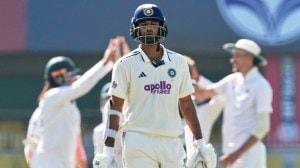Tara
Tara is the story of a modern Devdas who drowns his lost love not in alcohol but by painting his lady-love and leading an armed rebellion against the State and its corrupt sponsors.
Tara is about they,not about the stars that shimmer in the dark. It is not about we or you but they. Who are they? Are they the rebels hiding in the forests trying to cleanse society of corrupt and exploiting abusers of the poor and the oppressed with violence?
Tara is an ambitious film aimed at redefining mainstream cinema with a different story told in the directors individual language. But the results do not add up. Alternately,Tara is the story of a modern Devdas who drowns his lost love not in alcohol but by painting his lady-love and leading an armed rebellion against the State and its corrupt sponsors.
The story has two layers. One layer reveals the action of the Maoists hiding in the forests in Lalgadh headed by Indra Bose (Prosenjit),a painter,and his group of rebels whose cache of sophisticated but illegal arms would embarrass any state government.
The other is an expose of the rotten system of law,order,the administrative machinery and the body politic. The love between Madhuja (Paoli Dam) and the honest-but-suspended police officer Jehangir Khan (Tota Roychoudhury) is incidental to this expose.
Indras crusade suddenly switches channels to save Madhuja and her falsely implicated and imprisoned father from the clutches of a corrupt administrative system. Indra,you see,has been madly in love with Madhuja since his student days though she does not know him or about his obsession. When he is not on a killing spree of corrupt hooligans,traders,businessmen and politicians,he paints innumerable portraits of his lady love.
The quality of his art explains why he did not choose art as his vocation. It does not explain why he joined the Maoist movement in the first place and brought in his sister to perform mundane chores and obey his commands unquestioningly.
Tota Roychoudhury is real eye-candy with his sex-appeal. As Jehangir Khan,his performance is very good but gets bogged down by the love-almost-at-first-sight angle when he rescues Madhuja from the clutches of local goons and from Naidu,the Maoist leader from Andhra Pradesh.
What Naidu is doing in West Bengal is not explained. Indra is more concerned about Naidu (Bratya Basu)s plans to abduct Madhuja. Why he wants to abduct her is hazy. Prosenjit looks tired,jaded and not very interested in his character. Dusky beauty Paoli Dam hardly has any role. Her appearance bears no scars of her panic-stricken existence. Bratya Basu is brilliant as Naidu while Gautam Halder as the local politician who terrorises with the outdated Yankee phrase Mama Mia is so bad that we are relieved when Indra decides to free us from the misery of watching him. Chandan Sen is wasted in an inane role.
Unlike most triangular love stories,in Tara,no one dies in the end. Indra goes safely back into the forests after requesting Jehangir to take good care of Madhuja. Her father is released.
Technically,the film outshines the form and the content. The cinematography is brilliant both in its capturing of the forests with natural light filtering through the trees,the rebels hideout flooded with Madhujas portraits,zeroing in on Madhujas home scenario,the streets of Kolkata – mysteriously deserted all the time and so on.
Noted artist Sameer Aich who performs a cameo,has enriched the film with his art direction. Tapan Sinhas music is vested with Bratya Basus mindblowing lyrics,specially the Rashid Khan Raag Pradhan number.
Rating:***
The three stars are for the cinematography,the art direction and the acting of Basu and Tota. But it remains to be seen if technical excellence can justify a badly muddled script and its execution on screen.



- 01
- 02
- 03
- 04
- 05




























